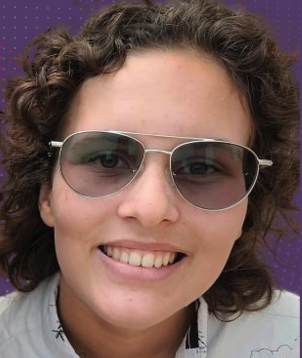Stories
Stories are a powerful tool for communication, support, and building community.
Our story collection includes links to first hand accounts, digital stories, articles, comics, zines, anthologies and more. Click on the coloured tags to view by topic.
“Our stories are important. Our stories are sacred...and my story is sacred. Being able to connect with other queer people who have experienced cancer, it makes it feel like the experience is less isolating. ”
KB & Cancer Queers
KB is a US-based non-binary queer activist, artist, musician, & writer. They were diagnosed with breast cancer in April 2022 at the age of 31.
Young, queer & caring for family
Angeline (they/she) is a queer teen living in Toronto with her mom & brother. Her mom is living with metastatic breast cancer.
My sexual self
A digital story (video) from the Cancer’s Margins project about the effects of ovarian cancer treatment on feeling sexual & the experience of seeking support.
Navigating breast cancer as a LQBTIQ couple
This podcast episode features Mel & Riki's story of breast cancer treatment, body image changes & fertility decisions.
Mary Morgan: Radical, fierce & bold
QC co-founder Mary describes her personal healing, new community, & a reaffirmation of living fully despite her cancer diagnosis.
Surviving AIDS, facing cancer without community
Ross reflects on facing treatment alone, shaped by a lifetime of self-reliance & the lasting impact of the AIDS crisis.
Drag queens and dobermans
Vivi found healing through a self-made support group of dogs & divas!
Chatty guy talks cancer care and hope
Martin shares his journey & hope through his podcast exploring life, faith, & cancer care.
Robert Eads: Southern comfort
Trans man Robert Eads faced medical neglect before late-stage ovarian cancer treatment; his story inspired the documentary Southern Comfort.
Caregiving & sarcoma
Arialle, a lesbian with stage IV uterine sarcoma, & her wife Tara share their cancer & caregiving journey.
Navigating care as a gender non-conforming lesbian
Gina's experience reveals the healthcare system’s lack of understanding & calls for more inclusive, queer-affirming care & support.
Love notes from the chemo room
Poet & activist Andrea Gibson lives with late stage ovarian cancer.
Early detection made all the difference
John was diagnosed with non-melanoma skin cancer, he stresses the importance of early detection.
From misdiagnosis to mission
After Paula's colorectal cancer diagnosis, she became a tireless advocate based on her lived experience as a young Black lesbian.
Let somebody know you
Global news article detailing disparities in care for queer & BIPOC people with cancer that features several stories.
"My experience is real, my body is real"
Amy was diagnosed with stage four throat cancer, and after her cancer treatments, she decided to begin her transition.
Living openly through blood cancer
Scott explains the benefits of honest communication about your life, health & sexuality when you’re diagnosed with blood cancer.




















